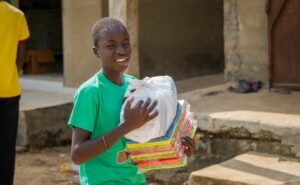Rehabilitation of schools in the province of Fatick in Senegal
State : In progress | Number of beneficiaries : 2500 students
Project duration : 2022/2028
Place : Fatick region, Senegal
Project funded under a framework agreement by the Ministry of Foreign Affairs of the Grand Duchy of Luxembourg, and by the Jean Kerber Foundation under the aegis of the Luxembourg Foundation

Local partner
Youth and Development (JED) / Eclaireurs et Eclaireuses du Sénégal (EEDS) is a development NGO created in 1936, and established in all regions of Senegal, inspired by Scouting values, at the service of young people and the community. Its mission is to contribute to the improvement of the quality of life of populations, mainly in the field of health, education, socio-economic integration, water and the environment, by preparing especially young people in their role as active and responsible citizens in synergy with the Scouts and Scouts of Senegal.

Context
In Senegal, the gross primary school enrollment rate is relatively high: it was 84.9% in 2019 and is down compared to 2018 when it was 86.4%. The primary completion rate has improved in recent years and now stands at 62.3%.
However, learning conditions are reasons that lead young people to drop out of school and this is accentuated among girls. Indeed, access to quality latrines is not democratized in all schools. Thus, it is possible to see girls dropping out of classes because they cannot have proper menstrual hygiene. In addition, the proportion of schools with access to electricity is 23.7% in 2016. Finally, some schools do not have a fence that delimits the school grounds for security reasons and this represents nearly of 62.5% of establishments.
Thus, we can see that the issue is no longer at the level of children’s access to school but rather at the level of the quality of the infrastructures and the courses provided.
The mission
Overall objective: The educational conditions of vulnerable children in the province of Fatick are improved.
Specific objective: Children have access to quality school services.
Activities
- Improvement of school infrastructure: renovation of classrooms, construction of an administrative block and sanitary blocks, renovation of the school fence, establishment of a school infirmary
- Improvement of the quality of education: development of teachers’ pedagogical skills, establishment of tutoring,organization ofextra-curricular activities, enrollment of vulnerable children from surrounding villages, enrollment of children in CMU (Universal health coverage)
- Development of students’ life skills: raising children’s awareness of environmental education and leadership, reforestation of the school grounds
Beneficiaries
- Direct: 2500 students and 60 members of the teaching staff
- Indirect: 450 parents
